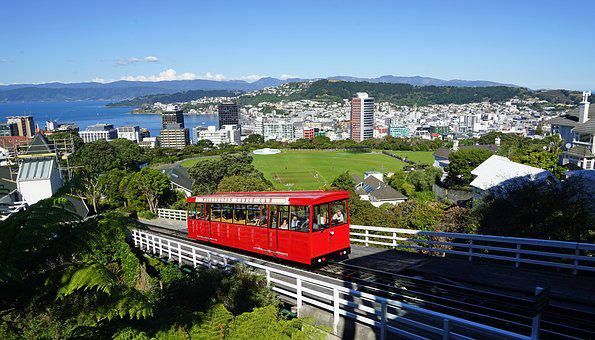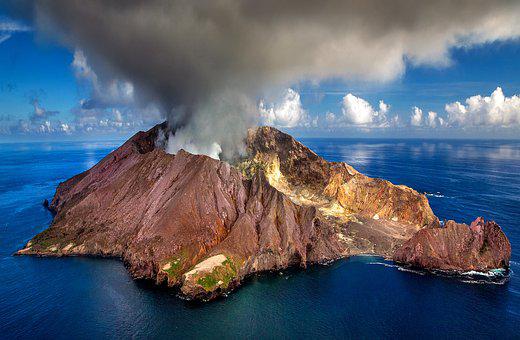New Zealand, the island nation with a population of approximately 4.5 million people, is best known for its international rugby team, indigenous Māori culture, beautiful rolling hills, amazing hiking trails, picturesque landscape, and breathtaking national parks.
The landscape and scenery of this island nation are so beautiful that many feature films have been shot at this location, including The Lord of The Rings, Wolverine, The Hobbit Trilogy, The Last Samurai, and The Lion, The Witch, and The Wardrobe – The Chronicles of Narnia, to mention a few.
If you have been mulling over the idea of moving to this island nation, you may want to preview some of the advantages and disadvantages of living in New Zealand.

Contents
Pros of Living in New Zealand
In this article, we will review some of the biggest advantages of making the move to New Zealand.
1. Good economy and great job market
Possibly one of the biggest attractions to this island nation is the stable job market.
The NZ job market promises steady growth over the next few years.
According to the Ministry of Business, Innovation, and Employment (MBIE), there is a predicted growth in the economy over the 2023 to 2028 period of 2.5%.
The government, in particular, has been trying to lure foreign skilled labor to migrate to New Zealand as there are a number of shortages in key industry sectors.
This is primarily due to the fact that the country has an aging population and there will be a substantial number of job openings in the future.
These positions will need to be filled by skilled foreign labor.
Some of the industries that are currently most in demand for skilled labor include:
- Business
- Construction
- Retail
- Food, culinary, and hospitality
- Accommodation
2. A great place to raise a family
New Zealand is one of the safer countries in the world.
In fact, the country ranks 77 out of 137 countries rated from most dangerous to least dangerous.
While there is a crime in the country, it is nowhere near as dangerous as in countries like South Africa, Brazil, and Venezuela.
The country has a strong economy, a great education system, a relatively low cost of living, great healthcare, low crime rates, and beautiful scenery, including national parks and hiking trails.
This puts New Zealand at the top of the list of safe countries to raise children in.
3. English is the official language
One of the biggest challenges facing ex-pats in foreign countries is mastering at least one of the official languages.
Luckily, in New Zealand, that language is English.
Apart from the language, the culture is very similar to Western culture, which makes adapting quite easy with little to no culture shock when first moving to New Zealand.
In fact, the country is most similar to the UK and Ireland in terms of having plenty of rain and lush greenery.
The cultural influences in New Zealand are predominately European and Māori, which makes adaptation for Europeans much easier.
But, more importantly, the culture in New Zealand is very warm and welcoming to immigrants and foreigners.
Furthermore, the country boasts a very open-minded culture that values freedom of religion as it is very tolerant of all religions.
The people are kind, friendly, and the outdoors and nature.
Most ex-pats find it very easy to acclimate to the new culture.
4. Great quality of life
According to the Better Life Index, New Zealand fares rather well in all areas of life in relation to other countries.
The site goes on to explain that the people of New Zealand generally outperform other countries in areas such as:
- Health
- Education
- Jobs
- Income
- Social connections
- Civic engagement
- Environmental quality
- Life satisfaction
The quality of life is directly related to things like cost of living, availability of jobs, good education and healthcare, advanced infrastructure, and civic engagement.
It is well known across the globe that New Zealand residents live a high quality of life.
It’s no secret that New Zealanders have a very strong work ethic.
In addition, the residents of this country strongly believe in a good work-life balance.
Most cities and towns are strategically located close to either a beach, national park, a hiking trail, or a biking trail.
5. A beautiful country
New Zealand has been the backdrop for some major feature films, such as The Hobbit Trilogy, The Lord of the Rings, and The Chronicles of Narnia, to mention a few.
And, watching these movies, it is easy to understand why this island nation was chosen.
New Zealand has some of the most beautiful natural scenery in the world, including glaciers, landscapes, mountain ranges, and lakes.
In fact, New Zealand has been rated as the third most beautiful country in the world.
What makes this country so beautiful is that it is largely unspoiled due to a low population density.
Most of the population and development in New Zealand is in the north of the island, while the south offers the most majestic scenery.
6. The climate
If you have ever traveled to South Africa, you will have an idea of what a perfect climate is.
Warm summers, cool autumns, and springs, and not too chilly winters.
The climate in New Zealand is very similar to the South African climate.
That is why so many South Africans and Brits opt to make the move to the island nation.
But, it has to be stated that the climate does vary quite a bit in this country.
The far north experiences a sub-tropical climate during the summer, while the inland may experience winters as cold as -10°C (14°F).
January and February are considered to be the warmest months in New Zealand, and July is the coldest month in this country.
If you plan on traveling to the country, you may want to consider doing that during the summer months in December, January, and February.
This is also the time that the country sees the most tourists.
Cons of Living in New Zealand
As with any country in the world, there are some disadvantages to making the move to the island nation.
1. You are somewhat isolated from the world
While there are many wonderful things to love about New Zealand, one of the major downsides is that it does feel somewhat isolated from the rest of the world.
If you are an ex-pat that has moved here, you will truly understand.
Expats rarely move with their extended family when they migrate.
This means that your family is more than likely still in your birth country.
If you are planning a trip home, plan to spend hours in airports and days on the plane.
And, if you like to travel internationally on vacation, you may find that living in New Zealand can be a drag, for the same reason.
Not only will you have to spend additional hours flying and traveling to get to your destination, but you will also need to spend more money on the cost of traveling.
Furthermore, imported goods have a heftier price tag due to the distance of shipping.
2. A bit too quiet
As of 2020, the population of New Zealand was 5.084 million people.
The population is seeing a slow down in growth.
The country has largely depended on international migration for its population growth.
The slowest growth rate over the past few years has been in the year 2021 and can largely be attributed to the Covid-19 pandemic.
But a smaller population also means another thing.
The cities are not as populated or busy as other metropolitan cities across the globe, such as London, New York, and Beijing.
While New Zealand does enjoy buzzing nightlife, it is nowhere near as busy as other bigger cities.
This means that New Zealand may not be as appealing to younger generations who may prefer the business of more populated cities.
It may, however, be more appealing to those looking for a slightly slower, more laid-back pace in life.
3. Tall poppy syndrome
New Zealand has an egalitarian culture.
This means that it is almost frowned upon to boast about personal achievement and those that do boast are quickly brought back down to size.
This is no secret and New Zealand is known across the globe for this the tall poppy syndrome in New Zealand seems to be having a negative effect on entrepreneurs and their well-being.
4. Housing prices
While New Zealand does present a high standard of living, housing prices in some of the more well-known cities are pretty steep in relation to the international housing market.
Auckland is one of the biggest cities in New Zealand and home to many immigrants, as many of the higher-paying jobs are in Auckland.
This has led to a housing crisis and the prices of properties for both buying and renting are going up substantially.
Many immigrants have pointed out that nearly half of their salaries go towards rent in this city.
5. Skin cancer
Sadly, there is a thinning of the ozone layer over the south pole which directly affects New Zealanders.
You would often see television advertisements featuring a talking bird imploring New Zealanders to wear a t-shirt, put on sunscreen, and wear a sun hat as protection against damaging UV rays during the 80s and 90s for exactly this reason.
The hole is not increasing and there seems to be evidence to support this, but it does pose a very real threat of skin cancer which affects all New Zealanders.

Pros and Cons of Living in New Zealand – Summary Table
| Pros of Living in New Zealand | Cons of Living in New Zealand |
|---|---|
| 1. Good economy and great job market | 1. You are somewhat isolated from the world |
| 2. A great place to raise a family | 2. A bit too quiet |
| 3. English is the official language | 3. Tall poppy syndrome |
| 4. Great quality of life | 4. Housing prices |
| 5. A beautiful country | 5. Skin cancer |
| 6. The climate |
New Zealand Safety Overview
READ THE FULL REPORT: New Zealand Safety Review
Safety Index:
- OVERALL RISK: LOW
- TRANSPORT & TAXIS RISK: LOW
- PICKPOCKETS RISK: LOW
- NATURAL DISASTERS RISK: MEDIUM
- MUGGING RISK: LOW
- TERRORISM RISK: LOW
- SCAMS RISK: LOW
- WOMEN TRAVELERS RISK: LOW
Frequently Asked Questions
Does New Zealand have high crime rates?
New Zealand does not have a substantially high crime rate.
However, after the pandemic, there does seem to be a rise in violent crime.
It is not clear yet whether this is simply a trend or something more permanent.
What is the most common crime in NZ?
Burglary, harassment, and fraud are the most common crimes in NZ.
What is the most popular tourist attraction in New Zealand?
Of all the things that you can do and see in New Zealand, the two most popular tourist attractions include Fiordland National Park and Milford Sound, South Island.
What food should I try in New Zealand?
There are a host of delicacies that you should try in New Zealand, including NZ lamb, fish and chips, and Kiwi BBQ.
What is the official language of New Zealand?
There are three official languages in New Zealand; Māori, New Zealand sign language, and English.












While many homes are beautiful to look at their construction standards are many decades behind North American codes. Many homes have ill fitting windows and doors , no active air extraction and inadequate or no heating. Homes are exorbitantly expensive.
An acquaintance of mine bought a relatively new home in a non urban area for $1,000,000 and had no heat source.
No I think it’s quite the opposite, depending on where you live however.
Totally agree. Insulation in a lot of homes are shockingly bad and because so many windows are only single glazed it gets quickly damp.
There’s a reason children develop asthma at an early age in nz.
I lived in both Auckland and Tauranga over 14 years and the house prices are over the top expensive for what you get. A lot of homes are glorified sheds and for a $1 – 2 million house that is just unacceptable. Luckily we made a killing selling our Auckland home and we took advantage of a cheaper and larger house in Germany. Paid cash. No mortgage ever again.
Nevertheless, i can say that nz is a relatively safe place and a pleasant place to live especially to raise a family.
Just bear in mind if you enjoy travelling do not move there. Flying out of nz is not cheap and I knew too many people that had never left nz or only ever visited Australia because further afield cost too much.
Sounds like a great country. I would like to visit sometime soon.😊
i live here 🙂
I live in Uzbekistan 🇺🇿. I really want to immigrate there. Could you give me some help or advise? 😊
Thank you for the article. I am contemplating about leaving Germany and migrating to New Zealand. I like your balance way of writing, one of the few articles that have both, pros and cons.
If you have children or adult family members with any learning difficulties or mental health issues, please look into the support they would receive. There seems to be very little understanding of disabilities here, and little support for children and families with problems.
This is inevitable for a small population, they have to choose what fits most people within a budget. Those with learning difficulties or mental health problems are not well served here at all.
Unfortunately, combined with their tall poppy syndrome, you can’t tell a Kiwi anything. They become quite defensive at even a hint of criticism.
Since you have to acknowledge problems or mistakes to improve or resolve, pretending it’s all wonderful really doesn’t help anyone.
In other words, I can’t see it improving any time soon, unfortunately.
Thank you Sue Lang for your comment. I find it the most helpful considering my 8 year old is about to leave for NZ to go settle with his father and has learning difficulties. I’m anxious about how he’ll do in school and I won’t be there to help… I’m hoping hiring tutors will be effective if there aren’t any learning centres provided for improvement.
YES. There is no ADA equivalent here and it’s alot harder to be a non-kiwi neurodivergent for sure. My symptoms are weaponised ALL THE TIME at work whenever I’m getting the tall poppy syndrome treatment and I am almost never allowed to leverage any of the self accomodation tactics I relied on back in the US.
The defensiveness is so frustrating as well — I work in an emerging field here (they’re 10 years behind due to slow adoption) where basically compliance is the key to success and the rules change roughly every 18 months. My performance reviews are literally full of “negative feedback” examples of me just straight up doing my job while doing backflips to be as sweet as sugar in my delivery (all while making a fraction of what I used to salary wise).
Be aware of backdoor bad references too because almost everyone knows someone who works at X and Tall Poppy syndrome bullying doesn’t end when you leave a company either (apparently you are supposed to starve as punishment for being vocationally competent lol)
Keep career expectations low for sure and go for as many coffee dates as you can to build relationships because the actual “work” aspect of the job is secondary here. Also Mid Nov through end of February is basically national summer break, so don’t expect to be productive during this period or find a new gig.
I lived in NZ for many years, having migrated from Eastern Europe. I found it incredibly culturally uninteresting and boring, which makes a difference for a young person growing up. It was hard at school – bullying and just negativity. I found it very difficult growing up in my youth. But you can do anything and nobody cares – which is not so great. Many people drink, smoke pot or just “get around”. I also did a bit of that to fit in. It’s hard to fit. People are conservative and think badly on one another. It’s very niche. It’s hard to get a nice feeling of culture or family. I moved eventually to – South America – and found that it is much luckier and easier with others. There is no back stabbing or pettiness. People are caring and kind and I don’t have the health conditions I had growing up in NZ. I found later in life (being 37 now) that it really doesn’t matter what social or economic status people or countries have. What matters is the goodness of the people, ease of life and just normal day to day down to earth care. Here in South America (I’m in Peru at the moment) i get a lot better treatment as a human, it’s kinder and my money goes a long way. I think there is a lot of potholes with money and wanting to self express or do what you love in NZ. A lot of creative jobs are impossible. People are mean. It’s hard to get through. It’s ok but there is also elitism and unfair treatment of people, of women also. I didn’t like it. And would not recommend it.
I lived in New Zealand for 20 years. Obviously. there were many things I valued about the experience. However, the longer I was there, the more the negatives became obvious and less tenable. As many have noted, housing is both substandard generally and also exorbitantly expensive. Over the last ten years or so, the “pecking order” in jobs has become very obvious. If you are not a natural-born Kiwi, you can expect to go to the “back of the line” no matter how meritorious your performance if a Kiwi needs or wants to be promoted (and it won’t matter if the Kiwi is really bad at their job). This is a country that loves to boast of its “tolerance” but can be quite stand-offish to anyone not privy to small social circles that start in kindergarten. Finally, if you are American, I will note that while being loudly “progressive” may save you from the very worst of the anti-Americanism, you will not get a free pass. Kiwis love to bash the USA (though consistently defer to China in order to sell dairy products and meat). The self-abasement expected of Americans who care about “fitting in” in New Zealand is shocking. (This is not just a “Trump era” phenomenon, btw. For 20 years I watched as Americans were forced to either accept relative social isolation from Kiwi-led groups, professional or otherwise, or be so self-critical that it bordered on humiliation).
Gosh I thought it was just me – but I’ve been here five years and still cant do anything right at work (and it’s always for some nothing burger reason related to my being “overqualified” or a dig about how I communicate) and don’t have anyone here I really consider to be an actual friend — (just people who get in touch when they need something).
I basically stay for the healthcare because I have a chronic illness that makes it worth it despite the isolation and low self esteem that I get in exchange.
Thanks for making me feel better about it — honestly!
NZ has suffered very badly from climate changes. There have been several serious floods, earthquakes etc. Inflation is now the worst in OECD and increasing! Food, rents, mortgages are taking more than the half of monthly salaries. Dental costs are exhorbitant and risk of skin cancer very high. As mentioned apart from new builds most properties have little of no insolation, no double glazing, poor construction, mould.
As a New Zealander, the fact that you’ve put great economy and job market is laughable. You’ve obviously done no research into the high cost of living and very little job opportunities in comparison to progression with career opportunities and first home buyer opportunities. As a high income earner, this country has become despicable. With high youth crime rates, barely a backyard for one million in Auckland, it’s no wonder intelligent kiwis are moving to Australia.
It’s not all bad here. Yes we have our share of challenges. But Australia is no ‘paradise’ either. It has to be one of the most highly regulated societies in the world and highly unionised; harsh climate change & getting worse; overcrowded & polluted cities; extreme racial tension and severe racism toward indigenous peoples; high cost of housing; dairy products that are inferior to world leading NZ dairy products; a host of dangerous creatures – poisonous snakes & spiders, ticks, other creepy crawlies, crocodiles, sharks, ginormous cane toads & other pests. And bush fires. Plus most of Australia is simply uninhabitable as it’s too hot. It’s just the outer fringe coastal areas that are inhabited. So, in short if you like lots of Aussies, racism, sexism, overcrowding, unstable bush fires breaking out, extreme climate, dangerous insects & animals, high cost of living, expensive housing, inferior cheese & milk, excessive & intrusive rules & regulations for every part of your life, enforced bankruptcy, highly unionised- well go right ahead & move there. The overwhelming majority of NZers return back to NZ. The grass isn’t always greener.
Thank you Angela was getting a bit fed-up with the nasty comments. I’m a 5th generation Kiwi and proud of it. If some people find NZ not to their taste, guess they’ll be happier elsewhere.
Most, if not all the comments made about NZ are very subjective and not representative of life here in NZ.
Every country on Earth has its problems, and NZ is no different. We don’t claim to be Paradise but life here is overall very good for native English speakers. It may be a lot harder for speakers of other languages, but that’s true of any country when one is not a native English speaker.
Life in NZ is far superior to any third world country you care to name. We have spectacular scenery, excellent employment prospects, good health & education systems (not perfect), stable economy, non-corrupt government, satisfactory housing and infrastructure.Yes, we have our share of problems, but which country doesn’t?
I dont agree. I have lived in 3 countries, and I find NZ to be the least emotionally intelligent. People are mean – the tall poppy syndrome is bullying, and if you are a migrant, Kiwis are not nice people. It’s very cliquey. These people have all known each other since childhood – so for a newcomer, you are just told to “fit in and shut up.” Merit doesn’t matter – the bullies get promoted. It is incredibly archaic with most things. Everything closes at 5pm so there is literally NO NIGHTLIFE either. Cold, damp, moldy houses, unfriendly people, and it rains for probably 10 months out of the year. Add to that the super high cost of living because the govt taxes everything including food.
I agree with you, Julie. I have also lived in 3 countries and I could not get out of NZ fast enough! The xenophobia is disgusting and the tall poppy syndrome, as well as the reverse racism, makes a mockery of anyone who wants to work. I did not care about the nightlife and the rain, but the houses are not built for the climate and the cost of living makes life miserable.
You forgot the bit about a giant super volcano on the north island, I think that should take the cake even before skin cancer.
It sucks here. It’s miles from anywhere and the people are awful. The drivers are psychotic too. Very unsophisticated place. Very boring. Everybody wears the same clothes and has the same friends they were school kids with. Rugby, fishing, TV and not much else.
YOHHH 😱😨 thanks for All the Enlightenment… I’m no longer going there with my family… NEVER! THANK GOD.
I’ve lived in NZ for 38yrs. I hardly sleep a wink. I’ve had four break-ins in the last three months. Almost everything has been stolen. I have travelled this country, lived a few places, but there is no peace. There’s not a night anywhere where you can get some sleep and feel safe. This country has broken my will to live. Most of it is people’s attitudes. The attempted gentrification by B,P,S means that the better off half of the country hates/actively harrasses the poorer half. I think a lot about dying just to get some rest. NZ is a lonely hellscape steeped in agri chemicals.